
Climate change
In any crisis, the following steps might help you survive, thrive, or perhaps impact change:
- What is the crisis? What words define it? What is the lexicon?
- Why should I care? How does this impact me? How will it impact my kids/grandkids?
- What are the mechanisms of cause and effect?
- What impact timeline can I expect?
- What can I do: directly, locally, globally?
- How can my understanding of the situation help me impact the situation?
“We are on the precipice of Hell”
-Frontline video HEAT
“Climate change is the biggest business opportunity in the history of Mankind”
-Tito Jankoski, climate change activist, carbon sequestration pioneer, HPA ’05
“Greenhouse”-why? how does a normal greenhouse work? what parts relate to which physical systems?
Demo: car dashboard is dark, absorbs visible radiation passing through the car windshield, re-radiates at lower frequency/longer waves (heat), which is trapped by the glass windshield.
glass=greenhouse gases (CO2, methane, water vapor)
Is this always bad? See diagram:
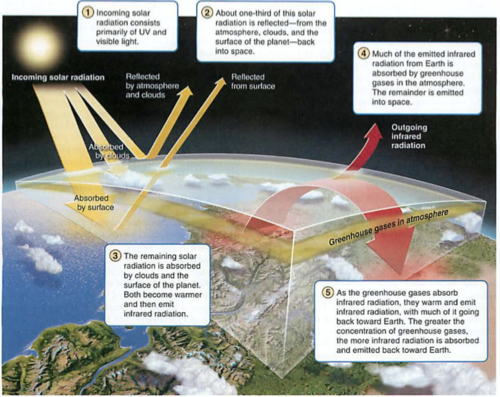
Earth would be 0°C without any greenhouse effect
These gases have different impact and lifespans:
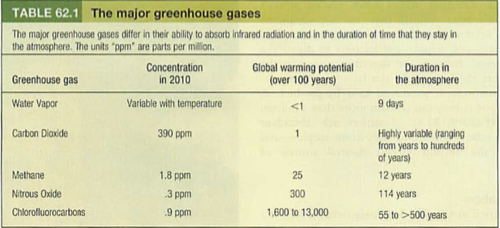
Where have I seen these before? You might not, but your parents certainly did, about 30 years ago, when the ozone layer was being destroyed by refrigerants (gases we created called “Freons” we used in refrigerators, freezers and air conditioners)
Without the ozone layer, everyone on the planet would suffer from UV radiation, causing skin cancers, plants would die, so would some life in the oceans. This was serious, causing an “ozone hole” over Antarctica:
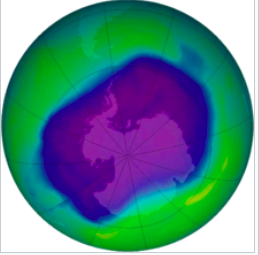 Here’s how we know we can act globally to avoid disaster:
Here’s how we know we can act globally to avoid disaster:
In 1997, most of the countries of the world met in Montreal Canada to create the Montreal Protocol, banning these CFC’s (chlorinated fluorocarbons) like Freon.
Here’s how we know it worked:
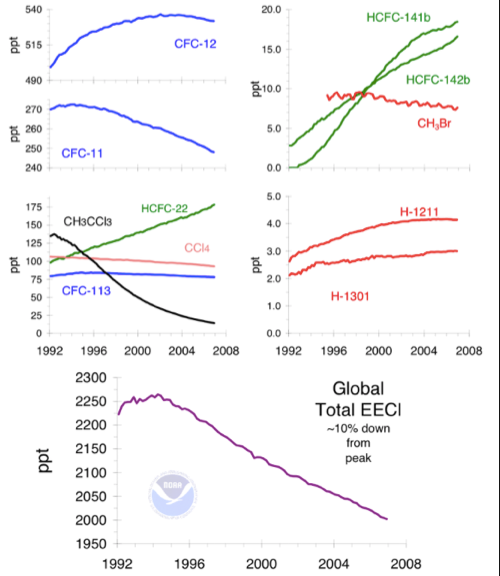 Note the bottom graph. What do you see? When did things change?
Note the bottom graph. What do you see? When did things change?
Here’s what the trend is for greenhouse gases: (2011 version on the link below)
http://physics.hpa.edu/physics/apenvsci/_pdf/aggi_2011.fig4.png
2017 version:
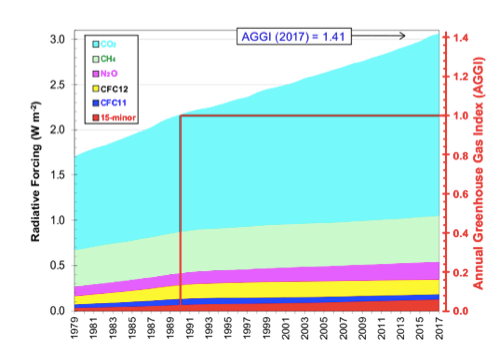
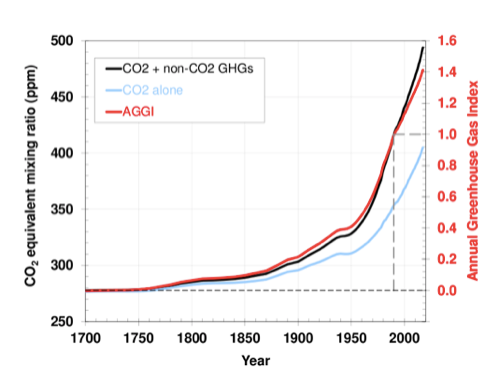
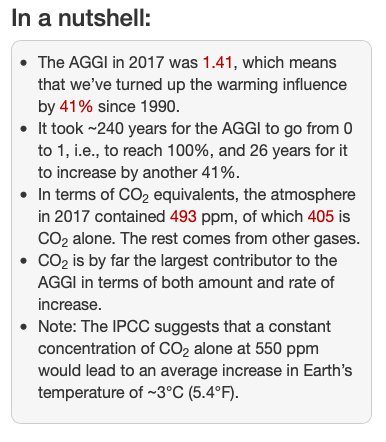
NASA simulation:
https://climate.nasa.gov/interactives/climate-time-machine
NASA Eyes simulation:
https://eyes.jpl.nasa.gov/eyes-on-the-earth.html
Where is this stuff coming from?
Ok, what gases are naturally sourced:
Volcanic eruptions (complex, as the ash can actually block sunlight, temporarily cooling the planet-see Mt. Pinatubo)
Decomposition/digestion (methane from termites and cow gas, or the truly horrific possibility of melting permafrost)
Denitrification (wet soils, wetlands where NO3 turns into N2O)
Evaporation/evapotranspiration (water vapor)
Human (anthropogenic) causes:
Fossil fuels use (coal, then oil then natural gas)
Deforestation
Agriculture (nitrogen fertilizers)
Landfills (methane again)
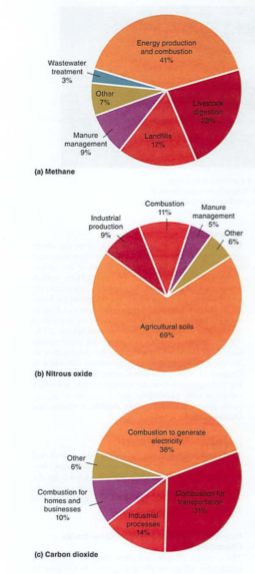
Two graphs are important to you:
Here is the pattern of CO2 measured at Mauna Loa since 1958, the famous “Keeling curve”
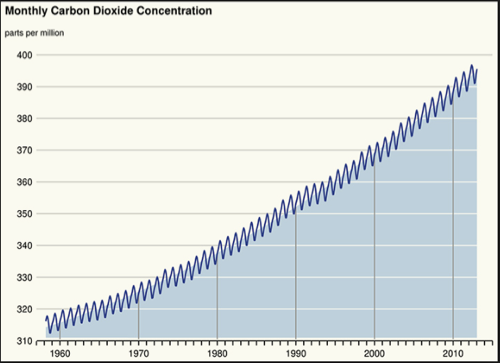 Here is the historical record, from ice cores and other data:
Here is the historical record, from ice cores and other data:
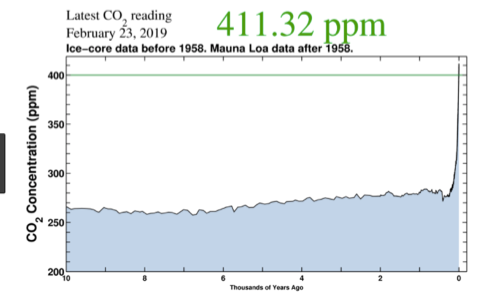
Note the date...
Where is this coming from, by nation?
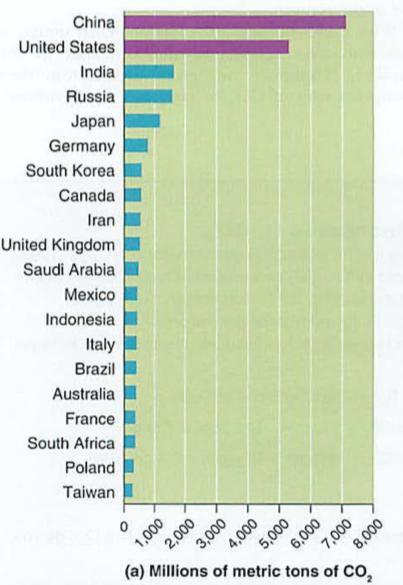 Why? US burns fossil fuels like maniacs, China is opening two coal fired power plants EACH WEEK, India is making concrete by heating CaCO3, releasing CO2 to make CaO (“Portland cement”)
Why? US burns fossil fuels like maniacs, China is opening two coal fired power plants EACH WEEK, India is making concrete by heating CaCO3, releasing CO2 to make CaO (“Portland cement”)
So what?
Global warming will change the global temperature, impacting weather, sea levels, severe storms, glaciers, water and food supplies
High CO2 causes ocean acidification, killing corals, and impacting all life in the ocean, a major absorber of CO2 and source of food
Finally, high CO2 levels make us stupid. Anything over 800 ppm has been demonstrated to impact learning, memory and complex thought. There is no escaping this, much like the ozone crisis of the 1980’s
Here’s how warm it is getting:
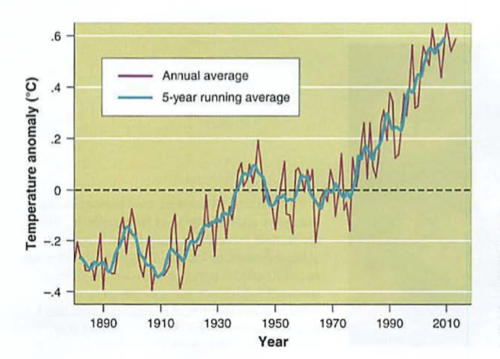 How do we know CO2 and temp are related?
How do we know CO2 and temp are related?
Check this out:
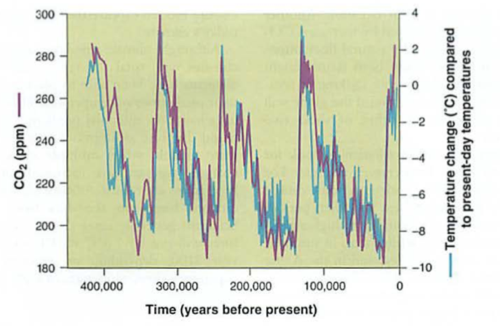
Here’s what this will look like when you are having grandchildren:
The first picture is 2020-2029, the right side is 2100, when you are in your 90’s:
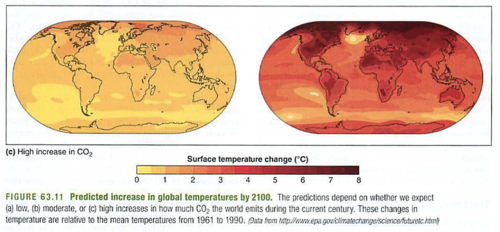 These assume a constant rate, which is unlikely if the permafrost begins to melt, releasing more methane, and the polar ice caps melt, changing the albedo (remember Albus Dumbledore).
These assume a constant rate, which is unlikely if the permafrost begins to melt, releasing more methane, and the polar ice caps melt, changing the albedo (remember Albus Dumbledore).
This is an example of a positive feedback loop.
n.b. most folks believe that ocean levels will rise from the melting ice caps and glaciers. This is only a small impact, the greatest impact is that water expands when it warms, so ALL of the water in the ocean is expanding at once, and the ocean is several miles deep around the world-think of that!
https://fitzlab.shinyapps.io/cityapp/
What can we do?
The IPCC (intergovernmental panel on climate change) inspired the 1997 Kyoto Protocols, which the US has not followed.
Here’s what they say:
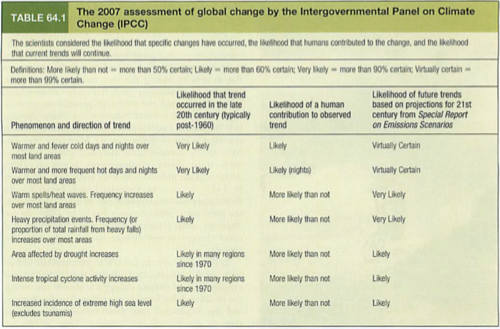
So, back to our questions:
- What is the crisis? What words define it? What is the lexicon?
- Why should I care? How does this impact me? How will it impact my kids/grandkids?
- What are the mechanisms of cause and effect?
- What impact timeline can I expect?
- What can I do: directly, locally, globally?
- How can my understanding of the situation help me impact the situation?
Comments